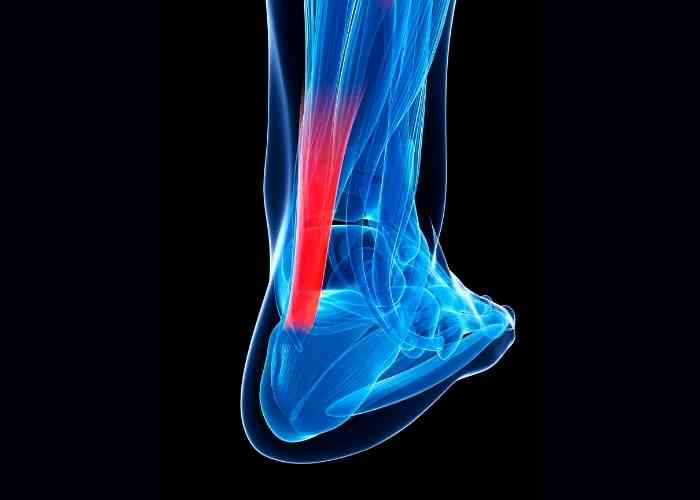Achilles Tendon Tear Specialist

Are you an athlete who participates in sports that involve running, jumping or quick pivoting? If so you may be at risk of injuring or tearing your Achilles Tendon in your ankle. An Achilles tendon tear can be debilitating and needs to be evaluated by a specialist as soon as possible. Achilles tendon tear specialist, Doctor Benedict Nwachukwu provides diagnosis and both surgical and nonsurgical treatment options for patients in Manhattan, New York City, NY who have injured their Achilles tendon. Contact Dr. Nwachukwu’s team today!
What is an Achilles tendon tear or rupture?
When the foot is pushed upward abruptly, the Achilles tendon may tear partially or completely away from its attachment site on the calcaneus (heel bone). Athletes that participate in high-endurance sports, such as basketball or tennis, or “weekend-warrior” athletes involved in skiing and snowboarding activities are most likely to sustain an Achilles tendon injury. There is also evidence that shows a higher rate of Achilles tendon ruptures among individuals who have taken fluoroquinolone oral antibiotics and/or used steroids. Dr. Benedict Nwachukwu, orthopedic ankle specialist serving Manhattan, Brooklyn, New York City, and surrounding New York boroughs is highly trained and experienced at diagnosing and treating Achilles tendon injuries, including an Achilles tendon rupture.

What are the symptoms of an Achilles tendon tear?
Individuals with a suspected Achilles tendon tear often report feeling a “pop” followed by immediate pain at the back of the heel. This typically occurs after an injury to the ankle such as sudden upward movement of the foot. An Achilles tendon tear often leads to a reduction in push-off strength. Ankle flexion may be retained in some individuals by using other flexor tendons. In some cases, individuals may lose the ability to walk entirely.
Who is at risk for an Achilles tendon tear or rupture?
Men are five-times more likely than women to suffer an Achilles tendon tear, especially men who are between 30 and 40 years of age. Athletes are also at high risk, especially those who participate in activities that require jumping or sudden starts and stops like basketball, running, soccer or tennis. Steroid injections have been linked to Achilles tendon ruptures, as well as certain antibiotics. Obesity can also be a contributing cause of Achilles tendon tears.
How is an Achilles tendon rupture or tear diagnosed?
It is strongly encouraged to consult a specialist if an Achilles tendon rupture or tear is suspected. Diagnosing Achilles tendon ruptures involves gathering a complete medical history followed by a thorough physical examination. Dr. Nwachukwu will perform diagnostic imaging studies such as an x-ray to rule out bone fractures or any other bone anomalies. Magnetic resonance imaging (MRI) analyzes the soft tissue structures of the ankle and can help confirm the diagnosis, as well as determine the severity of damage to the Achilles tendon.
What is the treatment for an Achilles tendon tear or rupture?
Non-surgical treatment options for Achilles tendon tear:
Patients with small Achilles tendon tears often respond well to nonsurgical therapies alone. Non-surgical treatment options may include:
- Activity modification
- Non-steroidal anti-inflammatory medications (NSAIDs)
- Adjusting shoe wear
- Bracing with a CAM boot
- Completing a physical therapy program.
Dr. Nwachukwu may also implement some newer alternative therapies such as biologic injections (platelet-rich plasma or stem cells) or extracorporeal shockwave therapy (ESWT) to stimulate healing of the Achilles tendon.
Surgical treatment options for Achilles tendon tear or rupture:
Surgical intervention is typically necessary for patients with severe or complex Achilles tendon tears or ruptures. An Achilles tendon rupture repair is done by suturing the torn ends of the Achilles tendon back together. This procedure is typically performed using a minimally invasive technique and specialized surgical instruments. In the event of a chronic tear (an “old” tear) or a large tendon gap, a tendon graft, from either the patient (autograft) or donor (allograft), is harvested and sewn into the native Achilles tendon. Tendon retraction and scarring often develop when a significant amount of time passes between the injury and surgical intervention.
